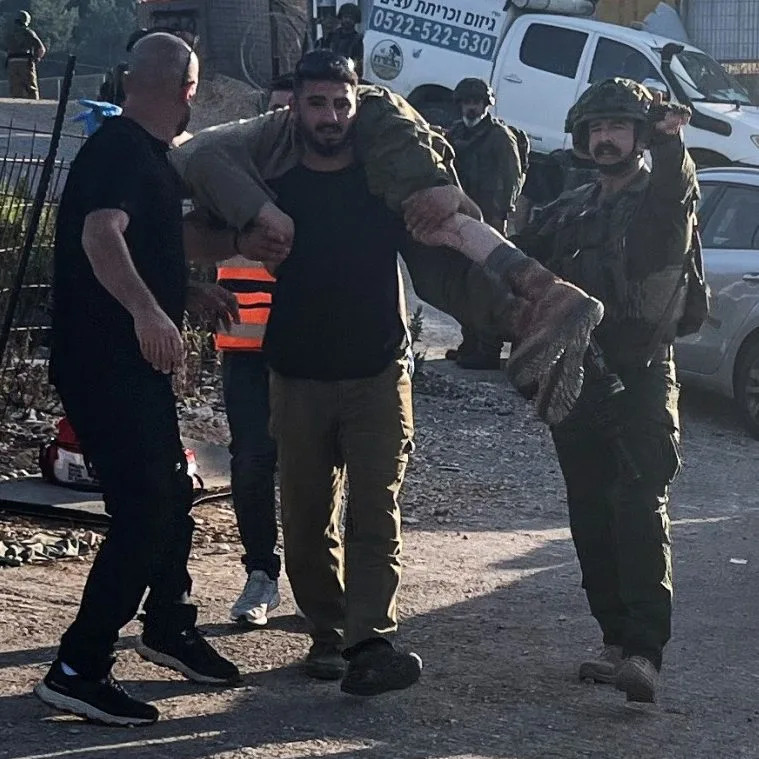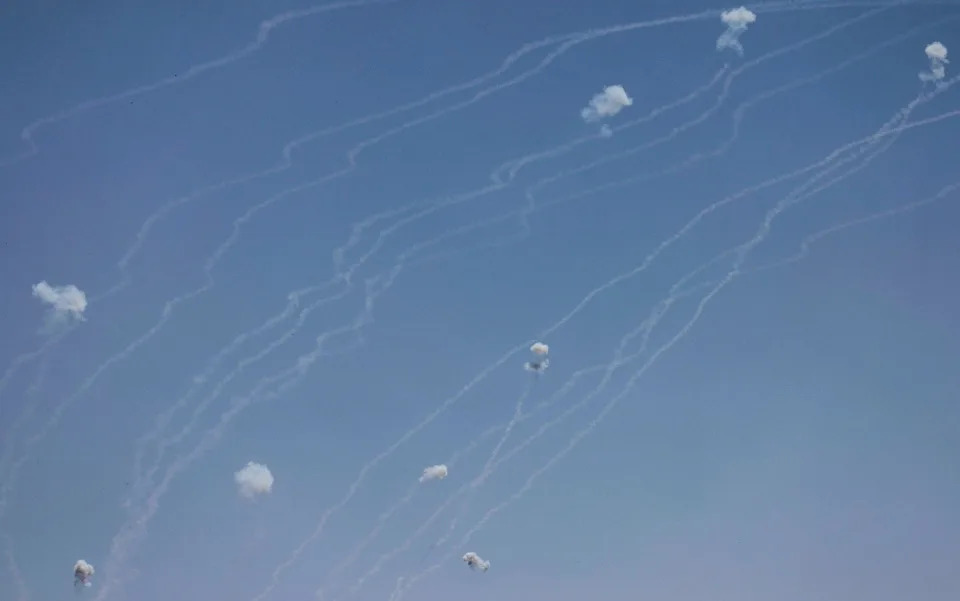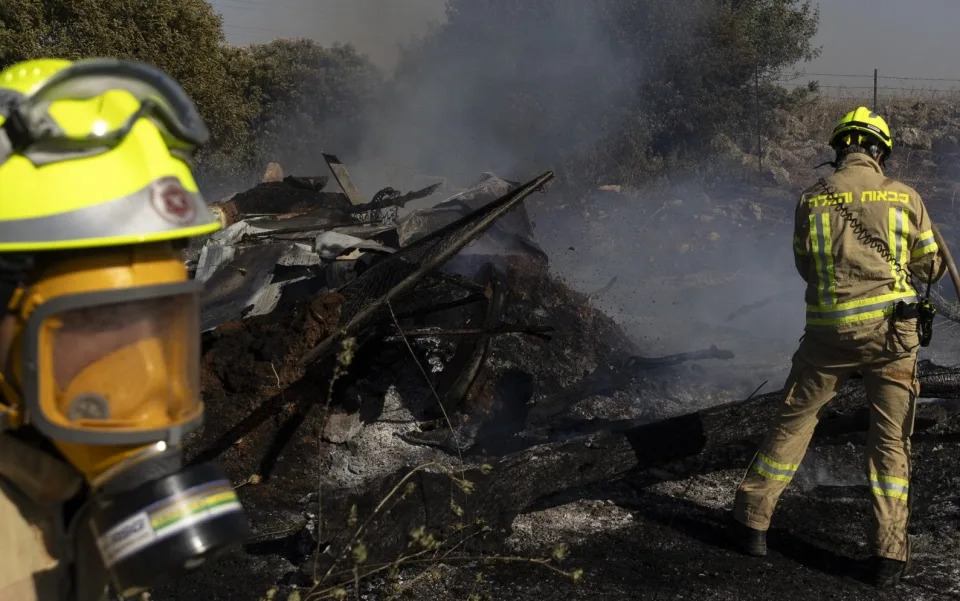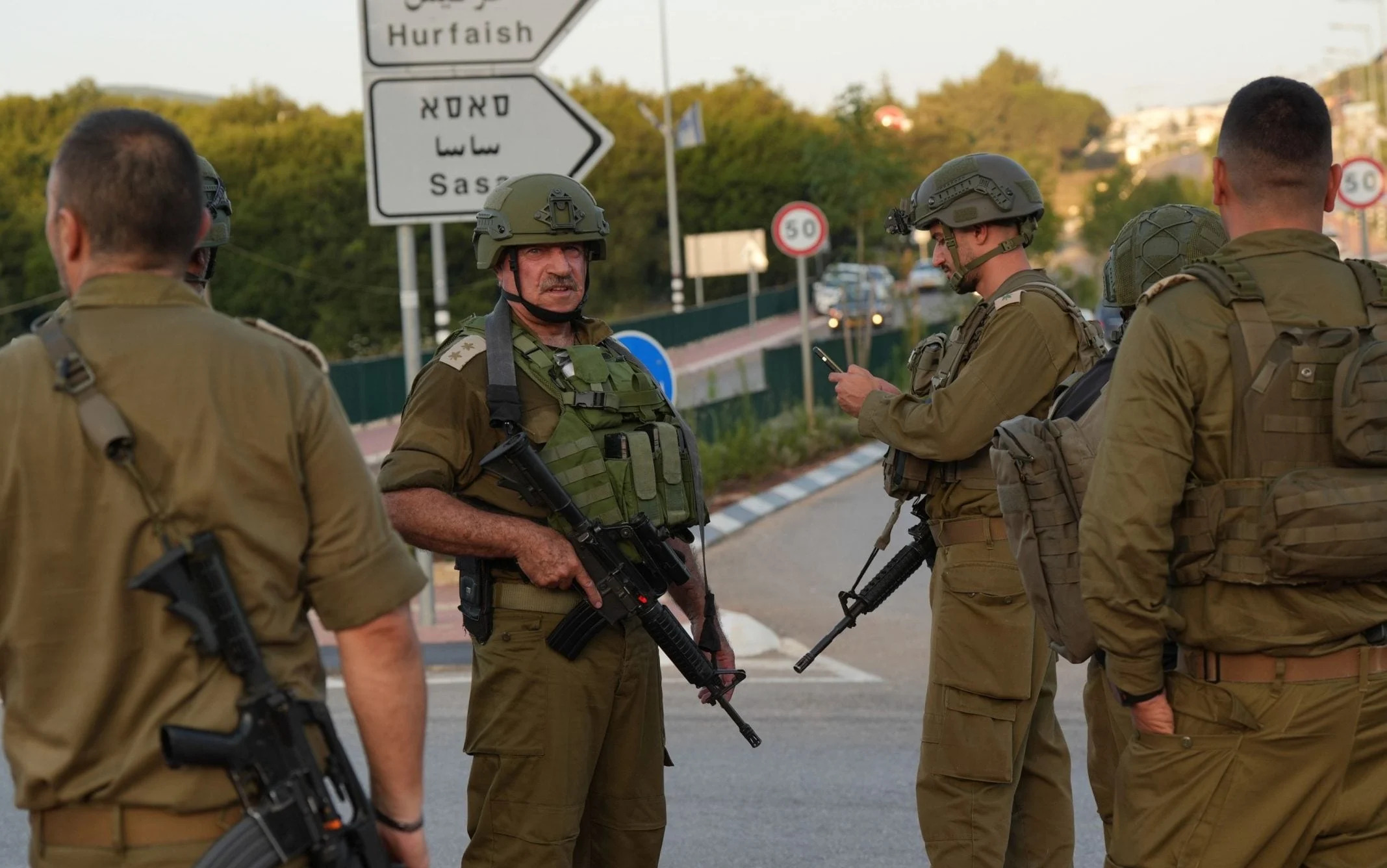Israeli soldiers in Hurfeish, northern Israel, on Wednesday. Ori Gordin, general of the Northern Command, said the deployment for a major offensive against Hezbollah has been completed -
Before the war began, winery owner Rami Na’aman loved to photograph the sunrise breaking over the distant Golan Heights from the porch of his ancient stone home in the Upper Galilee mountains.
On Oct 7, Mr Na’aman and his wife Bettina joined tens of thousands forced to flee Israel’s agricultural heartland under sustained rocket and drone attacks from Hezbollah militants along the nearby Lebanese border.
For the past eight months, he has made the perilous journey once a week from his temporary refuge near Tel Aviv to tend to his vineyards on the frontlines of tit-for-tat fire between Israeli and Hezbollah forces, facing the rising risk of bombings as he prepares the land for the summer harvest.
This week his village of Ramot Naftali had seen even more assaults than before, said Mr Na’aman.
“There were several incidents around our very close area every day. There were rockets inside our village and next to it,” he said. “It feels like we have been abandoned and nobody cares.”
But the grinding conflict in the north has come into sharp focus again in recent days after cross-border strikes reached a new level of intensity with larger and more sophisticated weaponry that has deepened fears of an all-out Israel-Hezbollah conflict or even a regional war.

On Saturday, Hezbollah took responsibility for at least 10 attacks in northern Israel and claimed to have fired a volley of heavy Falaq-2 rockets at a military base in Beit Hillel.
If verified, it would mark the first use of this weapon which is manufactured in Iran and features a 60kg warhead and a range of 11km.
Earlier, Israel was shocked when a soldier was killed and 10 others wounded in the town of Hurfeish by Hezbollah’s explosive-laden drones.
Public outcry over dramatic bushfires sparked by incoming missiles spurred Benjamin Netanyahu, the prime minister, to rush to the near abandoned northern town of Kiryat Shmona on Wednesday.
As he arrived, he threatened an “extremely powerful” response and “strong action” to restore security to the north.
While the low-intensity confrontation on the northern border is becoming untenable, few believe the Israeli government – barring its more extreme elements – wants to open up a second front in its eight-month war.
AfriPrime App link: FREE to download...
https://www.amazon.com/Africircle-AfriPrime/dp/B0D2M3F2JT

Hezbollah this week, through its deputy chief, Sheikh Naim Qassem, also indicated the Iran-backed militia was not seeking to widen the conflict with Israel but would not withdraw from the Lebanon border until the war in Gaza ends.
But agreement by Gaza’s Hamas leadership to a US-backed ceasefire deal that would halt hostilities in exchange for the return of Israeli hostages and Palestinian prisoners remains elusive.
While both sides of the Israel-Lebanon border have so far kept a lid on conflict spiralling out of control, experts warn that the latest round of hardball strategising risks tipping the region into a major war.
“The problem with low intensity war is that it is almost prone to miscalculation and escalation and in the last few days it reached really a dangerous level,” said Prof Yossi Mekelberg, an associate fellow at the Chatham House think tank.
“It is a very delicate moment between the two. Rationally neither side would like to confront each other in a full-blown war but the question is at what point they cross the point of no return.”
Israel was unable to disconnect the situation in the north from the south, leaving it in a “vicious circle” said former senior Israeli intelligence official Sima Shine.

“There is no decision yet made but I can tell you that in the security establishment there is a growing pressure to go for something wider.”
This could involve a combination of air strikes and a ground operation to meet growing demands for a bufferzone to be established on the Lebanese side of the border, she suggested.
While there had been talk of this zone extending to meet the terms of the 2006 UN Security Council resolution 1701, which required Hezbollah militias to retreat north of the Litani river, some 18 miles from the Israeli border, the buffer would likely be narrower, she said.
Israel, meanwhile, had “good intelligence” about the location of Hezbollah targets, but it faced the same phenomenon as it did in the south, that the militants had integrated themselves into local communities, raising the risk of civilian casualties, she said.
Brig Gen (Res) Assaf Orion, former head of the Israel Defense Forces strategic division, said an offensive would probably involve “massive intelligence-driven precision strikes on Lebanese Hezbollah targets across Lebanon and a land manoeuvre to destroy its army and suppress its short-range rocket fire”.
But a political agreement in the north may still be within reach if a ceasefire deal was reached with Hamas, suggested Avraham Levine, an analyst at the Alma Research and Education Centre.
AfriPrime App link: FREE to download...
https://www.amazon.com/Africircle-AfriPrime/dp/B0D2M3F2JT
Diplomatic agreement with Lebanon
While this would allow Israelis in the north to “go back to our normal lives” it would not remove the long-term threat from Hezbollah, said Mr Levine, who lives 2.5 miles from the Syrian border in the Golan Heights.
Israel could also seek a diplomatic agreement with Lebanon or help from UN forces to push Hezbollah back across the Litani River.
The last option would be a “ground manoeuvre” similar to the Gaza operation with “combined air force with armoured tanks and full force infantry, probably from more than one direction,” he said.
This kind of operation would be focused on southern Lebanon but not exclusively, as Hezbollah also has infrastructure in the Bekaa valley and the capital Beirut, he added.
The stakes would be alarmingly high for both sides.
Since October, about 100,000 Lebanese civilians, including many farmers, have already been displaced from the border region. An extension of hostilities would leave the conflict-weary population facing further economic ruin.
Militias in Syria, Iraq and Yemen
On the Israeli side, a ground operation would be “grave” and “more difficult than Gaza,” said Mr Levine, as it would face a much better prepared and armed enemy that could unleash its heavy weaponry on major Israeli cities and important infrastructure.
The Alma institute estimates Hezbollah has a formidable armoury including 150,000 mortars, 65,000 rockets with a range of up to 50 miles, 5,000 rockets and missiles with a range of 50-124 miles, 5,000 missiles with a range of 124 miles or more and 2,500 unmanned aerial vehicles (UAVs).
This could enable a daily air assault difficult even for Israel’s sophisticated defence systems to withstand.
“Lebanese Hezbollah would fire by all means available and launch Radwan cross-border attacks,” said Brig Gen Orion, referring to the militia’s commando division.
“The damage in Israel will be severe, and in Lebanon catastrophic. How does this war stop, and will the US have Israel’s back remain serious questions.”
The chilling scenario of widespread destruction in Israel and Lebanon through an escalating conflict that could draw pro-Iranian militias in Syria, Iraq and Yemen into the fight, has prompted the Biden administration to caution Israel against the notion of a “limited war” in Lebanon.
‘Of most beautiful places on Earth’
For vintners like Mr Na’aman, exiled from his home and watching his business being slowly destroyed, the prospect of a war raging out of control only increases a sense of helplessness.
A diplomatic solution would be the best option to allow Galilee’s residents to return and restore peace in “one of the most beautiful places on Earth,” he said.
“I think the best hope is if the government is changed and the fanatics move out and some more logical steps can be taken,” Mr Na’aman added.
Gan Haim, a fellow winemaker, who can now only access his boutique winery with the permission of the military, said he also favoured a diplomatic solution to the crisis.
A military operation would be “a disaster for Lebanon, a disaster for Israel,” he said, adding: “We should be smart and look at the long term.”
Israel was “now a sad society, we are in deep grief,” said Mr Haim.
“Even our vineyards are sad. When you have fires and endless gunpowder and people are going to the vineyards and they are scared,” he said, before adding: “We will prevail.”
AfriPrime App link: FREE to download...



